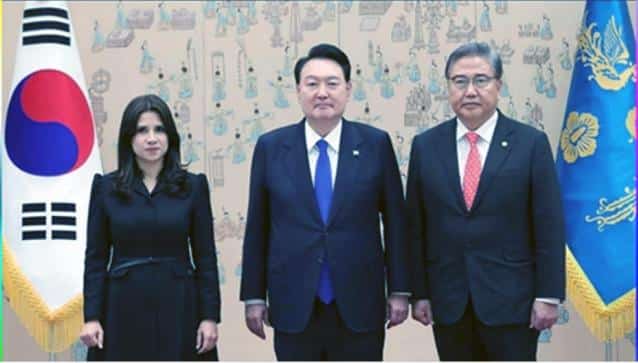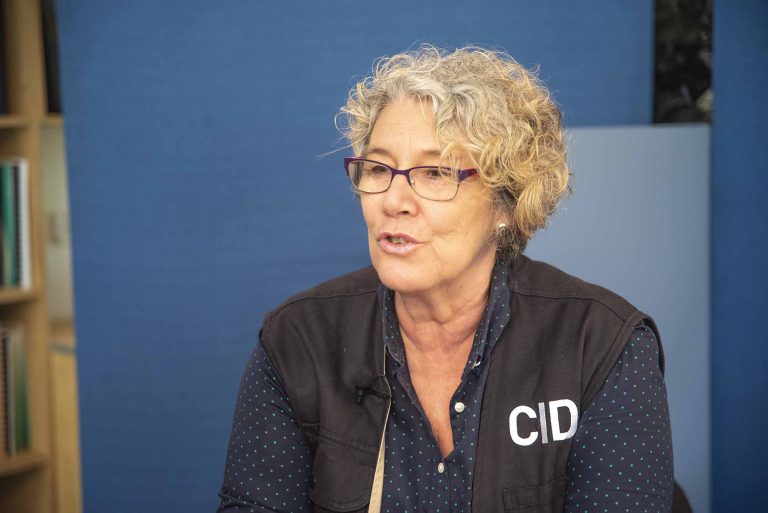6 de noviembre 2018

Closing of Nicaraguan Embassy in South Korea Increases Ortega's International Isolation

PUBLICIDAD 1M
PUBLICIDAD 4D
PUBLICIDAD 5D
Ana Maria Tello, Coordinator of MESINI: “We know of no detentions of paramilitaries.” IACHR insists that the paramilitary must be dismantled.

Ana Maria Tello
The Special Follow-Up Mechanism for Nicaragua (MESINI) estimates that Daniel Ortega’s Government has at least 400 political prisoners scattered throughout the country’s different prisons and penitentiary systems.
After almost six months of mission and constant reports of abuse in jail cells, the mechanism of the Inter-American Commission of Human Rights (IACHR) has not been able to corroborate the state of physical and psychological health of the inmates, who are accused of alleged crimes of “coup promoting and terrorism” for participating in civic protests and demanding justice and early elections.
Ana Maria Tello, coordinator of MESINI for Nicaragua, said they are concerned about the state of health of the political prisoners; especially and more recently, of the 17 women locked up in the “La Esperanza” (Hope) prison, whose relatives reported that they were beaten on the night of October 26th by hooded men dressed in black.
The MESINI tried to enter “La Esperanza” on Tuesday, October 30, to verify the status of the women political prisoners. However, the prison authorities prevented access to the penitentiary. There were no further explanations. Tello led the visit and noted on the program “Esta Semana” (This Week) that it is not the first time that the MESINI is prevented from entering a prison.
“It is not a new situation for the MESINI. The IACHR has made numerous requests to the Government to enter the prisons, but they have not been answered,” revealed Tello. “There has been successive official correspondence for MESINI to enter the prisons, but we have not been able to verify the state of the prisoners,” she insisted.
The denunciation on the 17 prisoners of “La Esperanza” is serious for MESINI because the testimonies of the relatives are very strong, and there is no information about Irlanda Jerez, the merchant who—according to her husband Daniel Esquivel—was placed in solitary confinement.
“The MESINI has received numerous complaints from organizations and relatives, including of fifteen years-old children in detention who are subjected to ill-treatment. We have not been able to verify it, but we have an important number of testimonies that are cross-checked by our team of lawyers,” said Tello. “The fact that they do not allow us to verify the state of the prisoners in the prisons, allows us to think about the reported mistreatment.”
The only response from the Government to the avalanche of denunciations and the insistence of MESINI has been to publish in its official media a series of photographs showing political prisoners receiving family visits and food packages. However, the relatives of the detainees alleged that it was a manipulation set in motion by the Deputy Minister of the Interior Luis Canas. According to the allegation, the photographs shown for the first time corresponded to the mandatory visit that prisoners must have when they are transferred to the penitentiary system. After that, the visits are irregular in the prisons.
Tamara Zamora, mother of Amaya Coppens, said that she has not been able to verify the physical condition of her daughter after the report made by other relatives and the lawyer of the Permanent Commission on Human Rights (CPDH), Julio Montenegro, on the beating received in “La Esperanza.”
The Coordinator of MESINI also warned about the health condition of political prisoner Brenda Munoz, who suffers from terminal cancer. “There is no information on her health status. She has a serious problem, a chronic illness. MESINI had access to her medical record, and the situation is serious…and, eventually, terminal. We appeal to a humanitarian act by the Government, to let her be in a medical center,” expressed Tello.
The repression unleashed to quell civic protest has caused more than 325 deaths and thousands of wounded. Despite the abundant visual evidence involving police officers and paramilitaries, the MESINI does not identify among the 400 prisoners it has counted, any police officer or paramilitary who has been arrested or is being investigated or prosecuted.
“We do not know about the arrest of paramilitaries. One of the recommendations of the first report of the IACHR is that the state must dismantle these paramilitaries; demobilize the forces that are not of the State, and the Police must act in accordance with national and international law,” Tello urged.
The MESINI—as well as the Interdisciplinary Group of Independent Experts (GIEI)—have informed that the Government of Daniel Ortega and its institutions do not collaborate with them to carry out their mandate in the country. They are not provided with access to vital information, such as court records or even access to public trials of detainees.
“We do not have access to court records. Regarding the paramilitaries, it is not enough to admit the fact (that they committed a crime) but that justice should be applied, to identify and try those responsible,” said Tello. “We also do not have information on the wounded or deaths of those close to the government. We do not have information about their health status.”
The regime has reported that about 50 people have been convicted thus far. But MESINI has not been able, despite the fact that it has made requests to the Prosecutor’s Office, to provide follow-up to the handling of the cases and due process has not been complied with.
The coordinator of MESINI stated that GIEI recommended the creation of a Special Prosecutor’s Office, a figure that has been used in several countries with situations of systematic violations of human rights similar to the one Nicaragua is going through. “These Prosecutor’s Offices are spaces of trust so that victims can approach new institutions,” assured Tello.
The latest press release of MESINI provides information on the human rights violations that persist, such as the arbitrary arrest of citizens who are previously identified. “There is concern about the deteriorating health conditions of prisoners with chronic illnesses,” emphasized Tello.
Putting aside the argument by the regime that what happened in Nicaragua was a coup attempt, MESINI documented the “violent nature” of repression against the civic rebellion, which, in the opinion of experts, was disproportionate.
The Coordinator of MESINI also drew attention to the precarious situation in which Nicaraguans who have fled to Costa Rica are living. According to the most recent figures, more than 40 thousand Nicaraguans have crossed the southern border in search of refuge.
“Nicaraguans in Costa Rica do not have work, food and those who have no families are sleeping in the open. We have seen a willingness of the Government of Costa Rica to address the situation, but that response is linked to the availability of funds and the work that can be done by other agencies such as UNHCR (United Nations High Commissioner for Refugees),” said Tello.
Although the Ortega regime prevents MESINI from exercising its mandate fully, Tello said that this mechanism has the task of collective information as human rights organizations do and then put it at the service of justice and reparation. “The MESINI is also set to collect information, follow-up and make recommendations on a permanent basis,” explained Tello.
Contrary to GIEI which only has a six-month mandate, the coordinator of MESINI recalled that their work in Nicaragua is indefinite. Since it was installed in Nicaragua, MESINI has been able to document the evolution of the repression, which now has become selective through detention and prosecution.
Archivado como:
PUBLICIDAD 3M
Periodista. Destaca en cobertura a violaciones de derechos humanos: desplazamiento forzado, tráfico ilegal en territorios indígenas, medio ambiente, conflictos mineros y ejecuciones extrajudiciales. Premio Iberoamericano Rey de España 2018.
PUBLICIDAD 3D